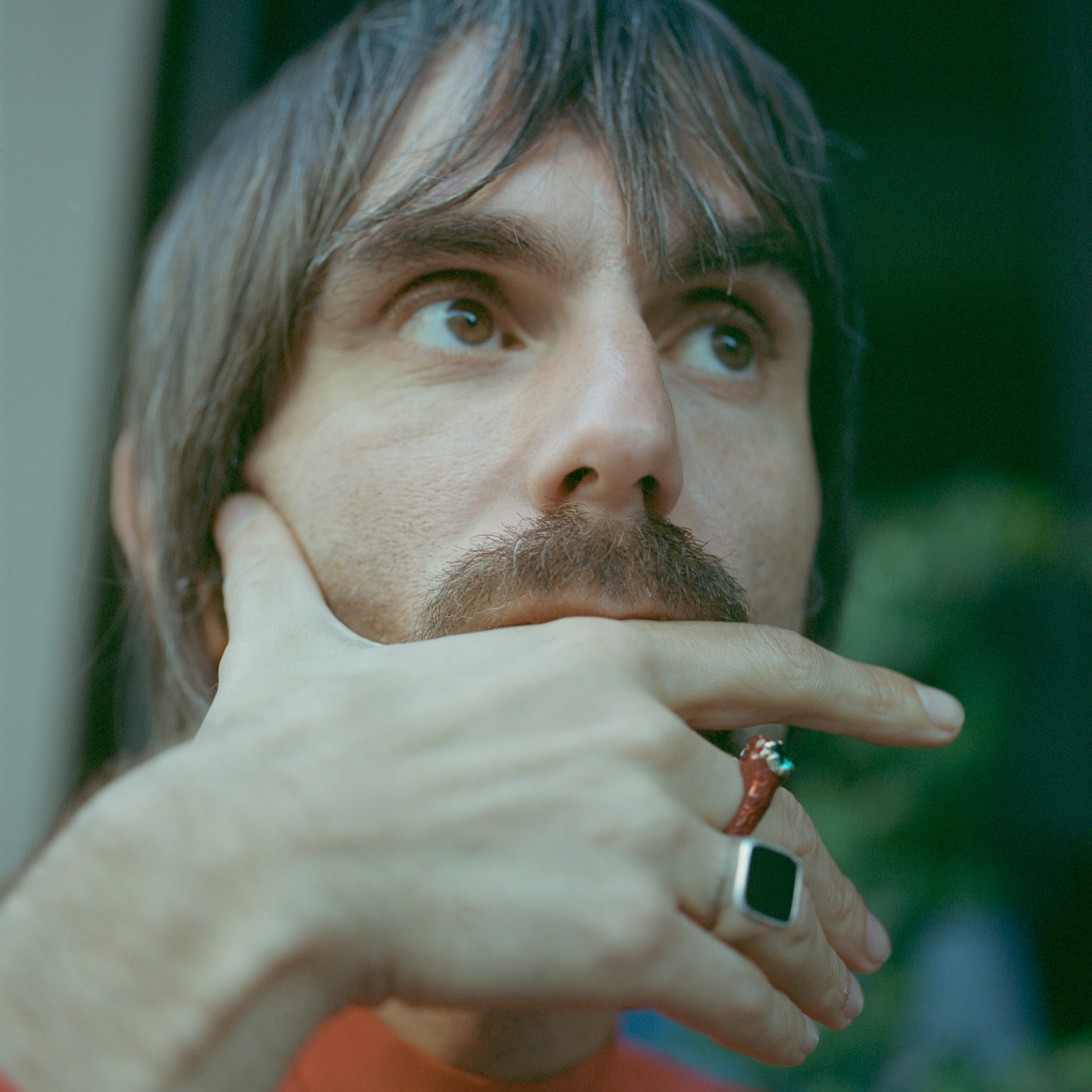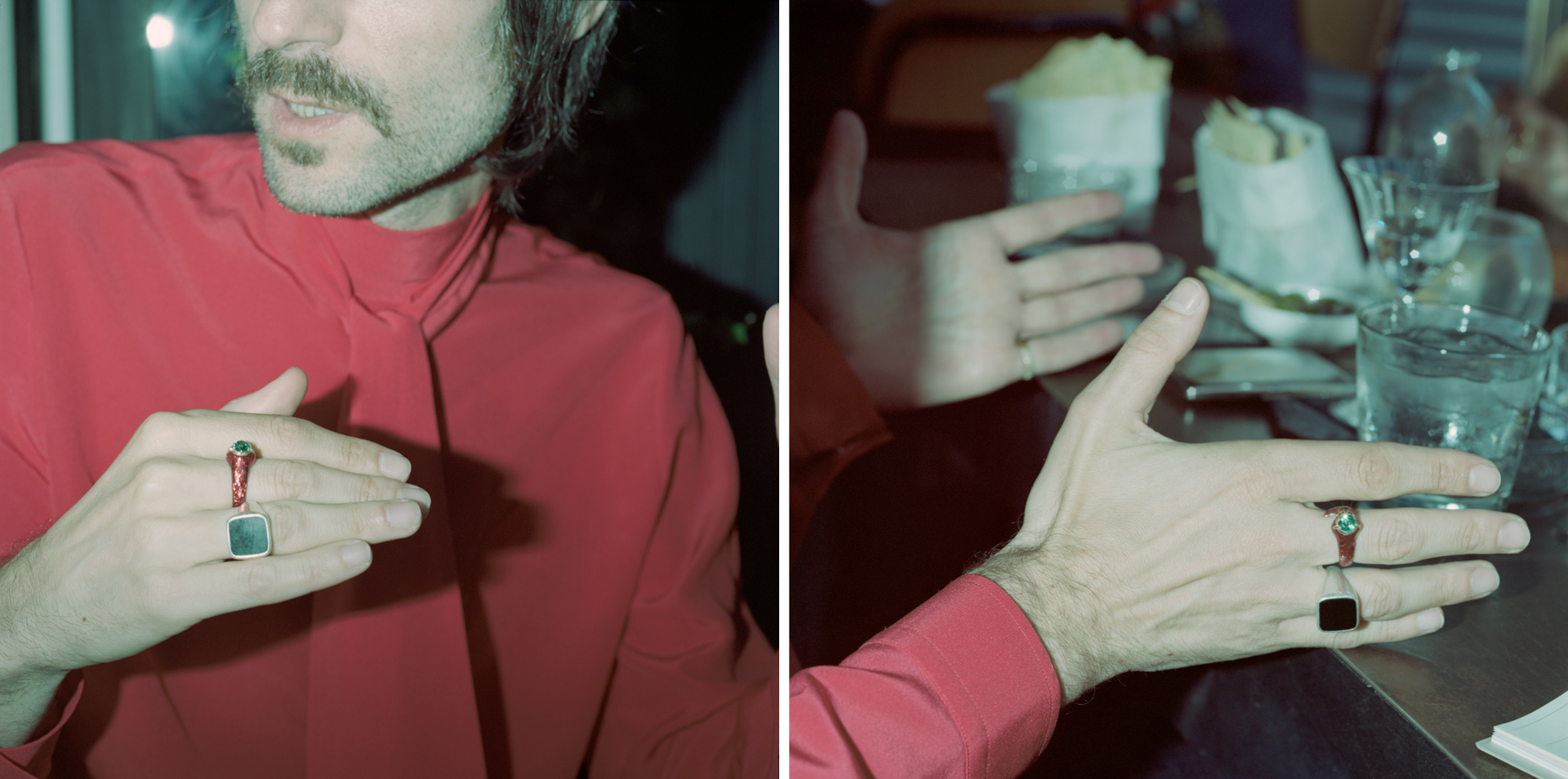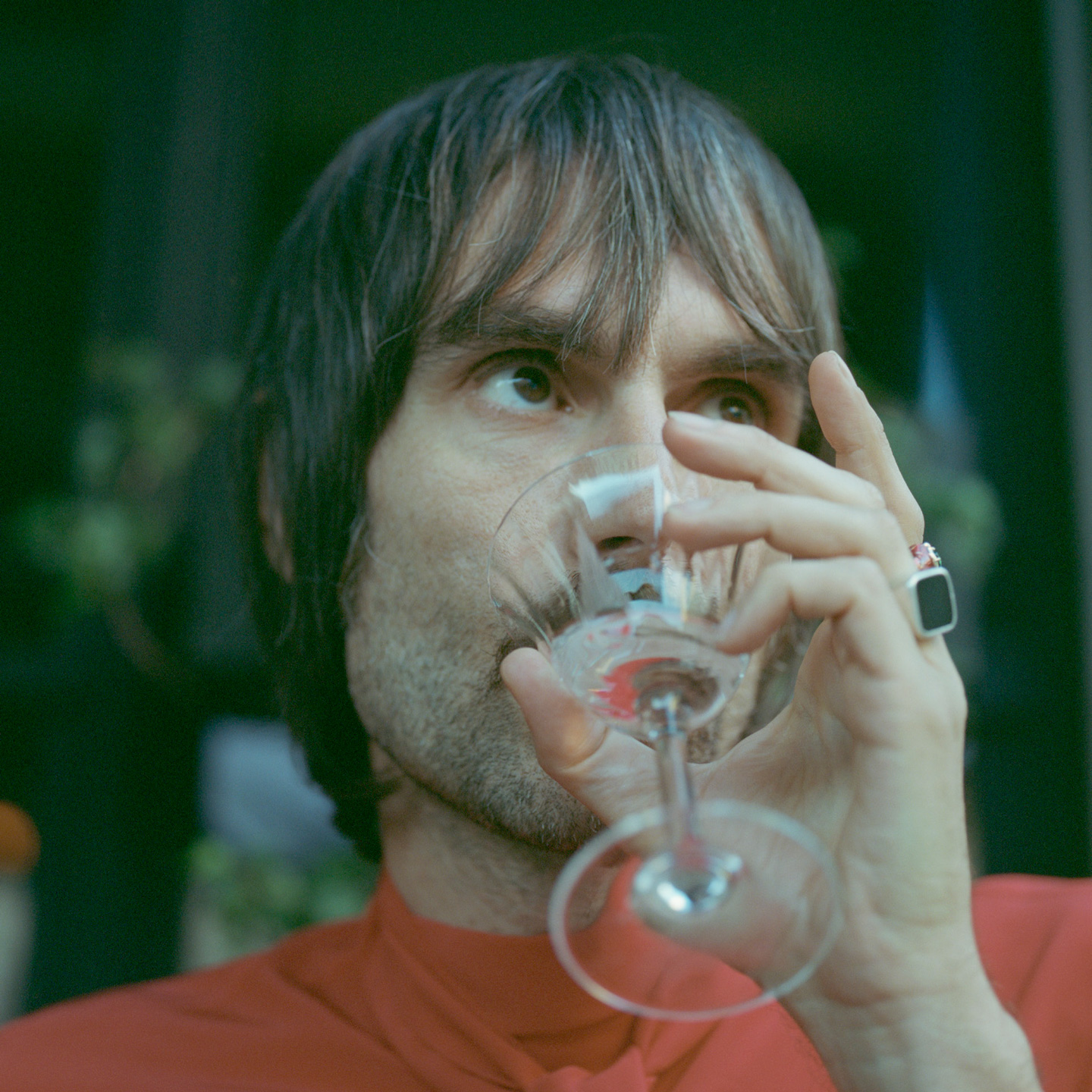Aperitivo with musician Francesco Bianconi
At The Botanical Club Via Pastrengo Milan
Conversation with Stefania Perosin Photography Alessandro Furchino Capria

-
SPFrancesco, to break the ice, I’m going to ask straight away what love is for you.
-
FBHmmm (he smiles, Ed.), I have an idea but it is only an idea. I have always tried to think of love as something absolute. A sort of higher power, a feeling that transcends relationships.
-
SPSomething connected to God?
-
FBNo, but it is metaphysical. I am an atheist, a non-believer, but I do like to think that love exists on a higher plane and is not exclusively linked to relationships, to two people falling in love or the erotic relationship. I believe that these aspects are only one part of what is generally considered love.
-
SPIs it a form of energy?
-
FBNo. It is a feeling that contains an aesthetic component, linked to seeing. It is simply a feeling that draws you closer to something other than you and makes you forget yourself. Although I do actually believe that this loss of egocentrism is only illusory: I am convinced that it is a projection of your thoughts onto the other person, especially in the initial phase of a relationship.
-
SPDo you need this feeling in order to write your songs?
-
FBYes, I think so. But any feeling works for writing songs. Even attraction, which is transitory. In any case, I like to think that love can go beyond that first initial phase and become something different, profoundly different, even. Jacques Brel, for example, said that tendresse (tenderness) was the most important thing for him.
-
SPBut can you write songs with tenderness? Personally, I have always thought that it was fundamental to suffer in order to give the best of yourself creatively and artistically. Don’t you find that?
-
FBIt is certainly simpler. It is hard and much less absorbing to write songs during periods of stasis.
-
SPI stick by my idea, although it may be banal: there is no creative spark without suffering.
-
FBYes, perhaps that is true. I can’t actually think of a single happy love song. Perhaps there aren’t any, I don’t know why. I quoted Brel before, because I think that some of his writing moves in that direction, but there is a sort of suffering in him too. His condition is similar to that of a choppy sea. Maybe you are right…
-
SPA sad verse from one of your songs has just come into my head. It’s from L’Aeroplano and it goes “Io ti amo e non ti penso mai” (Translation: I love you and I never think about you). What do you mean by that? Is it all the lost loves, the people we have loved? They aren’t around anymore, they are distant from us, but perhaps there are still traces of that love?
-
FBYes, I force myself to believe that love remains, in different forms. You abandoned somebody in the past, but you still feel something and that something is perhaps even more authentic and lucid that what you felt at the time. In fact, I would say that there, for the first time, the lover is not selfish. Perhaps it is the ideal condition.
-
SPWhat do you think of erotic impulse? Is it the motor that powers the world, as we have previously discussed?
-
FBWe have talked about the erotic drive a lot. I think it is connected to survival, a basic animal impulse, but I think that it is nonetheless a form of love. Physical attraction is aimed at the reproduction of the species, but this natural tendency does not only lead us to the reproductive act, but also to love each other.
-
SPSpeaking of which, have you seen Love Meetings by Pasolini? It is incredible because it offers a portrait of Italy in which sexuality was still a great taboo. Have things changed? Do you think sex is a topic that is openly discussed today, through music for example?
-
FBWe talk about it more nowadays and in different ways. There is an interesting book by Corriere della Sera journalist Ranieri Polese, called Per un bacio d’amor, which analyses the kiss in Italian songs. There’s a clear difference between Nilla Pizzi and Battisti (in the 1960s, Nilla Pizza represented traditional Italian music, while Lucio Battisti was an innovator and forerunner of xenophile styles, Ed.)! As for the situation nowadays, I personally find that references, even explicit references, to purely sexual experiences in Italian songs aren’t actually erotic.
I am an atheist, a non-believer, but I do like to think that love exists on a higher plane and is not exclusively linked to relationships, to two people falling in love or the erotic relationship. I believe that these aspects are only one part of what is generally considered love.

-
SPBecause they refer to love and sex in a way that is impersonal?
-
FBBecause, paradoxically, we talk about it too much nowadays! Sex is depicted everywhere. Just think of advertising and the exploitation of the female image: the topic inevitably becomes boring. This approach is a bit like saying “I’m not afraid, I’m not afraid, I’m not afraid” over and over again when in reality there are still a lot of taboo topics in our society. Sex is one of these and so is death.
-
SPPerhaps because they are two diametrically opposite forces, yet one cannot exist without the other.
-
FBYes, because the impulse I mentioned earlier, connected to the survival of the species, which sees sex as the driving force of life…
-
SP… is a way to combat death.
-
FB… is a way to combat death! They are completely entwined and should be analysed together. I tend to think of it that way. Perhaps that is why, unconsciously, Baustelle love songs often also mention death. In any case, it is evoked with an opposite presence.
-
SPViolence, for example? (The latest Baustelle album is called Love and Violence, Ed.)
-
FBLove is violent. Even the happiest love contains a small part of violence and suffering within it. But it is better for the sea to be rough or choppy… the flat calm is scarier.
-
SPMy sea is often in turmoil…
-
FBIn that case, you have to be good with a life ring. That’s an interesting way to be as well.
-
SPTell me the title of a book and a film that you think represent love well, even if imperfectly.
-
FBThe book, which I read recently, is by Michele Mari: Cento poesie d’amore a Ladyhawke. Mari provides a beautiful and poetic representation of true love. He is in love with a woman who is in a relationship and eventually decides to stay with her partner. There is so much love in these poems, even if the two lovers will never be together. He tells her: “Un posto nel tuo cuore / non lo voglio / perché quando farai l’amore / laggiù io sarei il clandestino / sballottato dalla tempesta / nella stiva.” (Translation: I don’t want a place / in your heart / because when you make love / I will be the stowaway / tossed around by the storm / in the hold”). It is a perfect description. I chose this example because I find it to be the maximum expression of lyricism and poetry. There are plenty of examples from cinema…
-
SPWe have often discussed Italian comedy, for example!
-
FBOh, yes. Italian comedy is interesting because there were so many costume changes in the ‘50s and ‘60s, and the screenwriters were so good at depicting how a backwards country tried to adapt to modernity. The screenplays by Sordi and Rodolfo Sonego were phenomenal. They were incredible writers who were skilled enough to narrate the dynamics within a relationship too. If I had to think of a perfect love film though, I would choose the Nouvelle Vague. I really like how European cinema, in comparison to Hollywood, tried to give a lighter, perhaps more realistic, depiction of love. I recently saw Lift to the Scaffold by Malle, it was exceptional, with a soundtrack by Miles Davis and the splendid Jeanne Moreau. It is unsettlingly modern and no Hollywood film could ever be that true.
-
SPI think that The Bridges of Madison County is a beautiful example of American cinema. It’s the quintessential love film for me!
-
FBAnd by a quintessential American director… how did that film end again?
-
SPBadly. The thing is that the two main characters experience this incredible passion, but in the end, she returns to her family, her husband, her normality. And he continues travelling. I thought it was wonderful.
Sex is depicted everywhere. Just think of advertising and the exploitation of the female image: the topic inevitably becomes boring.

-
FBAll wonderful things come to an end…
-
SPJust like love… In the end, we will always discuss about it, isn’t it?
-
FBYes.
-
SPDo we have to?
-
FBYes.
-
SPSo it exists?
-
FBYes, it exists. But call it what you want.
-
SPWill the way you sing about love change?
-
FBYes, thank goodness! Change is always necessary. It would be interesting to try and write a story that nobody else has written. A happy love song, maybe?